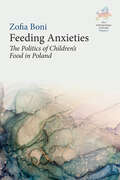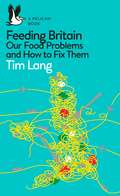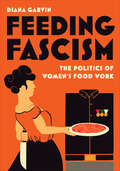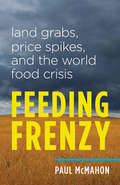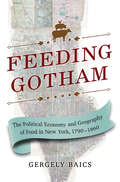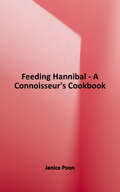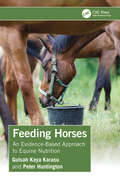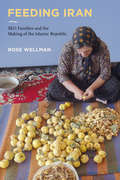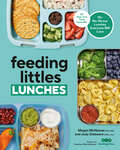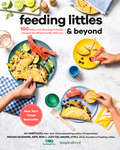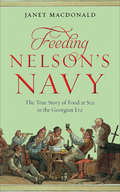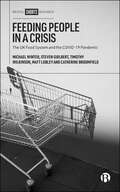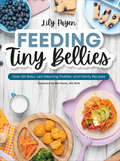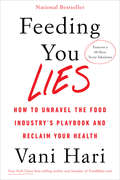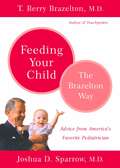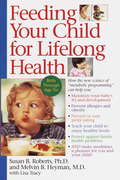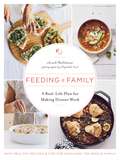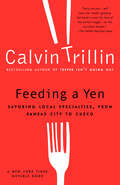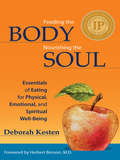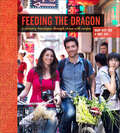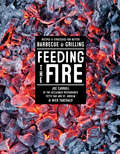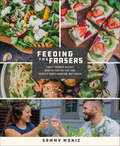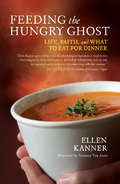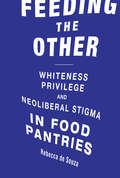- Table View
- List View
Feeding Anxieties: The Politics of Children's Food in Poland (New Anthropologies of Europe: Perspectives and Provocations #6)
by Zofia BoniFocusing on the underlying politics behind children’s food, this book highlights the variety of social relationships, expectations and emotions ingrained in feeding children in Poland. With rich ethnographic accounts, including research with children, the book demonstrates how families, schools, the food industry and state agencies shape and experience feeding anxieties, and how such anxiety is at the heart of a new form of sociality. The book complicates our understanding of health and modern subjectivity and unpacks what and how we feed children today.
Feeding Britain: Our Food Problems and How to Fix Them (Pelican Books)
by Tim LangHow does Britain get its food? Why is our current system at breaking point?How can we fix it before it is too late?British food has changed remarkably in the last half century. As we have become wealthier and more discerning, our food has Europeanized (pizza is children's favourite food) and internationalized (we eat the world's cuisines), yet our food culture remains fragmented, a mix of mass 'ultra-processed' substances alongside food as varied and good as anywhere else on the planet.This book takes stock of the UK food system: where it comes from, what we eat, its impact, fragilities and strengths. It is a book on the politics of food. It argues that the Brexit vote will force us to review our food system. Such an opportunity is sorely needed. After a brief frenzy of concern following the financial shock of 2008, the UK government has slumped once more into a vague hope that the food system will keep going on as before. Food, they said, just required a burst of agri-technology and more exports to pay for our massive imports.Feeding Britain argues that this and other approaches are short-sighted, against the public interest, and possibly even strategic folly. Setting a new course for UK food is no easy task but it is a process, this book urges, that needs to begin now.'Tim Lang has performed a public service' Simon Jenkins, Sunday Times
Feeding Fascism: The Politics of Women’s Food Work (Toronto Italian Studies)
by Diana GarvinFeeding Fascism explores how women negotiated the politics of Italy’s Fascist regime in their daily lives and how they fed their families through agricultural and industrial labour. The book looks at women’s experiences of Fascism by examining the material world in which they lived in relation to their thoughts, feelings, and actions. Over the past decade, Diana Garvin has conducted extensive research in Italian museums, libraries, and archives. Feeding Fascism includes illustrations of rare cookbooks, kitchen utensils, cafeteria plans, and culinary propaganda to connect women’s political beliefs with the places that they lived and worked and the objects that they owned and borrowed. Garvin draws on first-hand accounts, such as diaries, work songs, and drawings, that demonstrate how women and the Fascist state vied for control over national diet across many manifestations – cooking, feeding, and eating – to assert and negotiate their authority. Revealing the national stakes of daily choices, and the fine line between resistance and consent, Feeding Fascism attests to the power of food.
Feeding France
by E. C. SparyFeeding France is the first comprehensive study of the French food industry in the decades surrounding the French Revolution of 1789. Though the history of gastronomy and the restaurant have been explored by scholars, few are aware that France was also one of the first nations to produce industrial foods. In this time of political and social upheaval, chemists managed to succeed both as public food experts and as industrial food manufacturers. This book explores the intersection between knowledge, practice and commerce which made this new food expertise possible, and the institutional and experimental culture which housed it. Ranging from the exigencies of Old Regime bread-making to the industrial showcasing of gelatine manufacture, Emma Spary rewrites the history of the French relationship with food to show that industrialisation and patrimonialism were intimately intertwined.
Feeding Frenzy
by Paul McmahonFeeding Frenzy traces the history of the global food system and reveals the underlying causes of recent turmoil in food markets. Supplies are running short, prices keep spiking, and the media is full of talk of a world food crisis. The turmoil has unleashed some dangerous forces. Food-producing countries are banning exports even if this means starving their neighbors. Governments and corporations are scrambling to secure control of food supply chains. Powerful groups from the Middle East and Asia are acquiring farmland in poor countries to grow food for export - what some call land grabs. This raises some big questions. Can we continue to feed a burgeoning population? Are we running out of land and water? Can we rely on free markets to provide? This book reveals trends that could lead to more hunger and conflict. But Paul McMahon also outlines actions that can be taken to shape a sustainable and just food system.
Feeding Gotham: The Political Economy and Geography of Food in New York, 1790-1860
by Gergely BaicsNew York City witnessed unparalleled growth in the first half of the nineteenth century, its population rising from thirty thousand people to nearly a million in a matter of decades. Feeding Gotham looks at how America's first metropolis grappled with the challenge of provisioning its inhabitants. It tells the story of how access to food, once a public good, became a private matter left to free and unregulated markets--and of the profound consequences this had for American living standards and urban development.Taking readers from the early republic to the Civil War, Gergely Baics explores the changing dynamics of urban governance, market forces, and the built environment that defined New Yorkers' experiences of supplying their households. He paints a vibrant portrait of the public debates that propelled New York from a tightly regulated public market to a free-market system of provisioning, and shows how deregulation had its social costs and benefits. Baics uses cutting-edge GIS mapping techniques to reconstruct New York's changing food landscapes over half a century, following residents into neighborhood public markets, meat shops, and groceries across the city's expanding territory. He lays bare how unequal access to adequate and healthy food supplies led to an increasingly differentiated urban environment.A masterful blend of economic, social, and geographic history, Feeding Gotham traces how this highly fragmented geography of food access became a defining and enduring feature of the American city.
Feeding Hannibal: A Connoisseur's Cookbook
by Janice PoonFeeding Hannibal: A Connoisseur’s Cookbook is a collection of easy-to-follow recipes inspired by the show and created by its food stylist, Janice Poon. Each recipe is accompanied by fascinating insiders' anecdotes, delightful artwork, and revealing behind-the-scenes photos of stars and crew on the set of Hannibal.
Feeding Horses: An Evidence-Based Approach to Equine Nutrition
by Gulsah Kaya Karasu Peter HuntingtonThis concise handbook provides evidence-based, practical horse nutrition accessibleto all readers. Standing out from very dense, theoretical and practical horsenutrition books, it arms equine students, veterinary students and horse ownerswith practically applicable information, bringing theory and practice together.At the end of each chapter, veterinarian and equine nutrition experts Dr GulsahKaya Karasu and Dr Peter Huntington provide guidance on practical applications,calculations and the real-life use of information. For example, how is gastric ulcerformation triggered by traditional horse feeding? How can the risk of gastric ulcerformation be reduced with evidence-based feeding?Divided into four parts, the book covers the horse’s digestive system, types offeeds, formulating rations, and nutrition-related health disorders. Its scientificallyvalidated, practical information will be invaluable for horse owners, students andtrainers, equine nutritionists and practitioners within the equine industry.
Feeding Iran: Shi`i Families and the Making of the Islamic Republic
by Rose WellmanSince Iran's 1979 Revolution, the imperative to create and protect the inner purity of family and nation in the face of outside spiritual corruption has been a driving force in national politics. Through extensive fieldwork, Rose Wellman examines how Basiji families, as members of Iran's voluntary paramilitary organization, are encountering, enacting, and challenging this imperative. Her ethnography reveals how families and state elites are employing blood, food, and prayer in commemorations for martyrs in Islamic national rituals to create citizens who embody familial piety, purity, and closeness to God. Feeding Iran provides a rare and humanistic account of religion and family life in the post-revolutionary Islamic Republic that examines how home life and everyday piety are linked to state power.
Feeding Littles Lunches: 75+ No-Stress Lunches Everyone Will Love: Meal Planning for Kids
by Megan McNamee Judy Delaware75+ simple and delicious ideas for packed school lunches and snacks for kids of all ages, from the New York Times bestselling authors of Feeding Littles and Beyond.In a lunch packing rut? Megan McNamee and Judy Delaware, the founders of Feeding Littles, are here to help with the ultimate lunch box resource. Feeding Littles Lunches is complete with 75+ lunches that are quick to assemble, safe and easy for kids of all ages to eat, and balanced in nutrients for growth, learning and play. Each lunch idea is easily modified for nine of the most common allergens and includes tips for picky eaters, plus vegetarian swaps and &“I Can&’t Even&” tips to make lunch packing even easier. Feeding Littles Lunches is not a recipe book because, let&’s face it, most parents don&’t want to spend hours packing lunches. Rather, it&’s an inspo book with a full-page photo for every lunch, meant to be used with your child as a visual reminder for delicious and easy new ideas that you can assemble from simple ingredients. Feeding Littles Lunches also includes a lunch packing formula to help you plan your own lunches, grocery lists, tips for dealing with cafeteria and school settings, picky eating, food safety, and more! With creative and approachable lunches like Chicken Salad with Mini Brioche Toasts, Sun Butter Banana Roll-Up &“Sushi-Style,&” Build-Your-Own Naan Pizza, Leftover Burger Mini Sliders, Pesto Turkey Wrap Rounds, and more, you&’ll bring joy back to lunchtime.
Feeding Littles and Beyond: 100 Baby-Led-Weaning-Friendly Recipes the Whole Family Will Love
by Ali Maffucci Megan McNamee Judy DelawareAn inspirational, accessible family cookbook that offers everything a parent needs to bring joy and love back into the kitchen, by the baby and toddler feeding experts behind Feeding Littles and the New York Times bestselling cookbook author of Inspiralized.When it was time to introduce solids to her firstborn, Ali Maffucci didn&’t want to make baby food from scratch or buy expensive premade purées. Enter baby-led weaning (or baby-led feeding)—and Megan McNamee and Judy Delaware, the dietitian/occupational therapist duo behind preeminent parenting resource Feeding Littles—which skips spoon-feeding altogether so babies can eat what the family eats. As babies feed themselves, they explore a variety of aromas, shapes, and colors while developing fine motor skills, hand-eye coordination, dexterity, and healthy eating habits. McNamee and Delaware also help their clients navigate—or prevent—picky eating at all ages and raise a generation of intuitive eaters who listen to their bodies and love a variety of food. Now, these powerhouse authors unite to provide a plan that will reduce stress and anxiety around mealtimes, nourish your loved ones, and satisfy everyone&’s palate with fun, easy, nutritious recipes. Maffucci, Delaware, and McNamee offer:strategies for baby-led weaning/feeding, as well as safety and other common parental concernshow to meal-prep in a way that works for your scheduletips for dealing with challenges such as picky eaters and dining outa one-of-a-kind visual index for plating food that babies can feed to themselves100+ delicious recipes in categories including Morning Fuel (with plenty of egg-free options), Less Is More (using five ingredients or less), and Mostly Homemade (no shame in using pantry staples!)modifications for families with allergiespositive food language and how to promote body positivityand much moreWith this book in hand, mealtimes will be easier and more enjoyable for everyone—from your six-month-old, to your picky toddler, to the other kids and adults in the family. As parents, the authors know that getting food on the table is hard enough, so whether you&’re making a five-minute grilled cheese or pumpkin waffles, it&’s time to start celebrating every bite.
Feeding Nelson’s Navy: The True Story Of Food At Sea In The Georgian Era
by Janet MacdonaldThe author of How to Cook from A-Z disproves the myth of British navy culinary misconduct in “a work of serious history that is a delight to read” (British Food in America). This celebration of the Georgian sailor’s diet reveals how the navy’s administrators fed a fleet of more than 150,000 men, in ships that were often at sea for months on end and that had no recourse to either refrigeration or canning. Contrary to the prevailing image of rotten meat and weevily biscuits, their diet was a surprisingly hearty mixture of beer, brandy, salt beef and pork, peas, butter, cheese, hard biscuit, and the exotic sounding lobscouse, not to mention the Malaga raisins, oranges, lemons, figs, dates, and pumpkins which were available to ships on far-distant stations. In fact, by 1800 the British fleet had largely eradicated scurvy and other dietary disorders. While this scholarly work contains much of value to the historian, the author’s popular touch makes this an enthralling story for anyone with an interest in life at sea in the age of sail. “Overall this is an excellent examination of this crucial aspect of British naval power, and I’m certainly going to try out some of the recipes.” —HistoryOfWar.org
Feeding People in a Crisis: The UK Food System and the COVID-19 Pandemic
by Michael Winter Matt Lobley Steven Guilbert Timothy Wilkinson Catherine BroomfieldAvailable open access digitally under CC-BY-NC-ND licence. ‘Panic buying’ at the start of the COVID-19 pandemic generated enduring media images of empty supermarket shelves and calls for food rationing. The fragility of the 'just-in-time' food system was seemingly exposed yet, as the pandemic progressed in the UK, there were remarkably few food shortages. This book reveals the changing patterns of food provision in the UK during that period, looking at how diets changed and how retail, processing, distribution and production businesses adapted. But beneath the apparent logistical success story, there were injustices as the more vulnerable struggled to access good quality food and some businesses received inadequate help. The authors consider the winners and losers in a time of rapid social change, the lasting impacts on the UK food system and lessons to be learned for a food system dependent on imports and large retailers and with a high burden of diet-related health issues.
Feeding Tiny Bellies: Over 100 Baby-Led Weaning, Toddler, and Family Recipes: A Cookbook
by Lily PayenA unique baby-led weaning cookbook from Lily Payen of Feeding Tiny Bellies, with over 100 easy recipes for feeding little ones and beyondLily Payen, the mama behind the popular baby-led weaning website Feeding Tiny Bellies, knows how challenging it can be to start feeding solids to your baby. When Lily was a new parent faced with offering solids to her baby for the first time, she was lost on where to start, what to feed him, and how to balance making meals for the entire family. Through trial and error—and two more babies—Lily figured out what worked and what didn't. She created her website, and now, this cookbook, to help other parents and caregivers make meals they can feel confident about serving to their little ones. The 100+ simple recipes—from Strawberry Oatmeal Bars to Avocado Chicken Salad to Parmesan-Crusted Salmon—are designed for babies six months of age who are beginning solids, and each recipe includes tips for modifying and safely serving portions for babies.Lily guides you through the weaning journey, addressing the most commonly asked questions and providing advice for parents of picky eaters, children with allergies, and more. This book is your one-stop shop for creating delicious recipes that the whole family will love.
Feeding You Lies: How to Unravel the Food Industry's Playbook and Reclaim Your Health
by Vani HariThis follow-up to New York Times bestseller The Food Babe Way exposes the lies we've been told about our food--and takes readers on a journey to find healthy options.There's so much confusion about what to eat. Are you jumping from diet to diet and nothing seems to work? Are you sick of seeing contradictory health advice from experts? Just like the tobacco industry lied to us about the dangers of cigarettes, the same untruths, cover-ups, and deceptive practices are occurring in the food industry. Vani Hari, aka The Food Babe, blows the lid off the lies we've been fed about the food we eat--lies about its nutrient value, effects on our health, label information, and even the very science we base our food choices on. You'll discover: • How nutrition research is manipulated by food company-funded experts • How to spot fake news generated by Big Food • The tricks food companies use to make their food addictive • Why labels like "all natural" and "non-GMO" aren't what they seem and how to identify the healthiest food • Food marketing hoaxes that persuade us into buying junk food disguised as health foodVani guides you through a 48-hour Toxin Takedown to rid your pantry, and your body, of harmful chemicals--a quick and easy plan that anyone can do. A blueprint for living your life without preservatives, artificial sweeteners, additives, food dyes, or fillers, eating foods that truly nourish you and support your health, Feeding You Lies is the first step on a new path of truth in eating--and a journey to your best health ever.
Feeding Your Child - The Brazelton Way
by T. Berry Brazelton Joshua SparrowA wise new guide from America's most trusted pediatrician
Feeding Your Child for Lifelong Health
by Susan RobertsHow the new science of "metabolic programming" can help you: Maximize your baby's IQ and development / Prevent allergies and obesity / Prevent or cure picky eating / Teach your child to enjoy healthy foods / Protect against family health problems AND make mealtimes a pleasure for you and your child! In this groundbreaking book, two leading pediatric nutritionists--and experienced parents!--introduce exciting new research into "metabolic programming" and make it accessible and practical for every busy parent. They explain: How the foods you choose can optimize your baby's future development, IQ bone strength, and immunity / The eight key nutrients to focus on / Scientifically based "smart strategies" for working with your child's inborn instincts to build healthy eating habits / Food solutions for common problems--including colic, constipation, poor sleep, and hyperactivity / How to prevent or deal with food allergies or obesity / Easy ways to adapt family meals for kids--with menus and portion sizes for every stage from birth through age six, plus essential tips for food safety. What's more, you can teach your child to enjoy these healthy foods and banish food battles and picky eating forever. (From the Trade Paperback edition.)
Feeding a Family: A Real-Life Plan for Making Dinner Work
by Sarah Waldman40 seasonal meals, 100 recipes, and loads of tips and strategies to make weeknight dinners work Reclaim the family dinner! In Feeding a Family, nutritionist and mom Sarah Waldman lays out all the tools you need to break out of the mealtime rut and turn dinner into a nutritionally fulfilling and happy occasion—despite busy schedules, long work days, and picky eaters. Through forty complete meals, you’ll discover hearty dinners the whole family will love, including: · A meal for using up the best summer garden produce: Make-ahead Zucchini, Beef, and Haloumi Cheese Skewers with Chimichurri Sauce paired with Tomato, Peach, and Red Onion Panzanella and Lemon-Blackberry Custard · A cozy and comforting dinner for a frenzied fall day: Creamy Tomato and Spinach Soup with Grilled Cheese Croutons and Pear Pie in Cornmeal Crust · The perfect meal for the busiest night of the week: Slow Cooker Indian Butter Chicken with Sweet Peas and Lemon-Pecan Shortbread Cookies · A warming (and fun) winter meal: One-pot Slurpee Noodle Bowls with simple Chocolate, Peanut Butter, and Date Truffles for dessert · Sunday suppers for when you have a bit more time to play in the kitchen, such as Homemade Pasta with Heirloom Tomato Sauce and Pavlova with BlueberriesWith suggestions for including older kids in mealtime prep, tips for feeding baby, and ideas for extending ingredients for “tomorrow’s dinner,” Feeding a Family is a playbook that includes the whole family.
Feeding a Yen
by Calvin TrillinCalvin Trillin has never been a champion of the "continental cuisine" palaces he used to refer to as La Maison de la Casa House--nor of their successors, the trendy spots he calls "sleepy-time restaurants, where everything is served on a bed of something else." What he treasures is the superb local specialty. And he will go anywhere to find one.As it happens, some of Trillin's favorite dishes--pimientos de Padrón in northern Spain, for instance, or pan bagnat in Nice or posole in New Mexico--can't be found anywhere but in their place of origin. Those dishes are on his Register of Frustration and Deprivation. "On gray afternoons, I go over it," he writes, "like a miser who is both tantalizing and tormenting himself by poring over a list of people who owe him money." On brighter afternoons, he calls his travel agent. Trillin shares charming and funny tales of managing to have another go at, say, fried marlin in Barbados or the barbecue of his boyhood in Kansas City. Sometimes he returns with yet another listing for his Register--as when he travels to Ecuador for ceviche, only to encounter fanesca, a soup so difficult to make that it "should appear on an absolutely accurate menu as Potage Labor Intensive."We join the hunt for the authentic fish taco. We tag along on the "boudin blitzkrieg" in the part of Louisiana where people are accustomed to buying boudin and polishing it off in the parking lot or in their cars ("Cajun boudin not only doesn't get outside the state, it usually doesn't even get home"). In New York, we follow Trillin as he roams Queens with the sort of people who argue about where to find the finest Albanian burek and as he tries to use a glorious local specialty, the New York bagel, to lure his daughters back from California ("I understand that in some places out there if you buy a dozen wheat-germ bagels you get your choice of a bee-pollen bagel or a ginseng bagel free").Feeding a Yen is a delightful reminder of why New York magazine called Calvin Trillin "our funniest food writer."From the Hardcover edition.
Feeding the Body, Nourishing the Soul: Essentials Of Eating For Physical, Emotional And Spiritual Well-being
by Deborah KestenFeeding the Body, Nourishing the Soul leads us back to a deeper and healthier relationship to eating by drawing on ancient food wisdom from the world's religions and cultures. From Jewish dietary laws and the communion of Christianity to the food-based spiritual practices of Islam, Hinduism, and the Japanese tea ceremony, among many others, author Deborah Kesten shows how to create a more satisfying, spiritually oriented approach to food. Also includes cutting-edge scientific research on the life-giving properties of food, and fascinating insights from more than 45 scientists and spiritual teachers, including Jon Kabat-Zinn and Larry Dossey, to focus our attention on how to prepare both food and your state of mind so that you are nourished optimally.
Feeding the Dragon: A Culinary Travelogue Through China with Recipes
by Mary Kate Tate Nate TateThis beautifully illustrated cookbook and travelogue features 100 authentic recipes gathered from Shanghai to Xinjiang and beyond.Mandarin-speaking American siblings Mary Kate and Nate Tate traveled more than 9,700 miles through China, collecting stories, photographs, and lots of recipes. In Feeding the Dragon, they share what they saw, learned, and ate along the way. Highlighting nine unique regions, this volume features Buddhist vegetarian dishes enjoyed on the snowcapped mountains of Tibet, lamb kebabs served on the scorching desert of Xinjiang Province, and much more presented alongside personal stories and photographs.Recipes include Shanghai Soup Dumplings, Pineapple Rice, Coca-Cola Chicken Wings, Green Tea Shortbread Cookies, and Lychee Martinis. Feeding the Dragon also provides handy reference sidebars to guide cooks with time-saving shortcuts such as buying premade dumpling wrappers or using a blow-dryer to finish your Peking Duck. A comprehensive glossary of Chinese ingredients and their equivalent substitutions complete the book.
Feeding the Fire: Recipes and Strategies for Better Barbecue and Grilling
by Nick Fauchald Joe CarrollJoe Carroll makes stellar barbecue and grilled meats in Brooklyn, New York, at his acclaimed restaurants Fette Sau and St. Anselm. In Feeding the Fire, Carroll gives us his top 20 lessons and more than 75 recipes to make incredible fire-cooked foods at home, proving that you don’t need to have fancy equipment or long-held regional traditions to make succulent barbecue and grilled meats. Feeding the Fire teaches the hows and whys of live-fire cooking: how to create low and slow fires, how to properly grill chicken (leave it on the bone), why American whiskey blends so nicely with barbecued meats (both are flavored with charred wood), and how to make the best sides to serve with meat (keep it simple). Recipes nested within each lesson include Pulled Pork Shoulder, Beef Short Ribs, Bourbon-Brined Center-Cut Pork Chops, Grilled Clams with Garlic Butter, and Charred Long Beans. Anyone can follow these simple and straightforward lessons to become an expert.
Feeding the Frasers: Family Favorite Recipes Made to Feed the Five-Time CrossFit Games Champion, Mat Fraser
by Sammy MonizBased on Sammy Moniz's popular Instagram page, Feeding the Frasers is a book that any CrossFit aficionado—or just someone curious about how to cook with whole foods without sacrificing the world—will want to get their hands on.Filled with 100 terrific recipes of high quality delicious food that promote balance, togetherness, indulgence, and athletic recovery. Sammy Moniz is well known in the CrossFit community as an activist, and she is also the wife of five time champion Mat Fraser, the winningest athlete in CrossFit history and one of the most beloved. This is her cookbook where she shares the secrets behind feeding the greatest champion of the sport.
Feeding the Hungry Ghost
by Ellen KannerA combination of writing about food and food traditions, descriptions of cultural and religious traditions where food is central (from Haiti soup night to a recipe for a dish to break the fast of Ramadan). The book is broken into parts: seeds; flowering; harvest; compost. She includes Judeo-Christian, Haitian, Turkish, Muslim, African, Mexican, traditions, both religious and secular, around food and how people use food to soothe, celebrate, commemorate, grieve, and connect with each other. The author is active in the sustainable eating movement and writes regularly for the Huffington Post (meatless Monday blog); Gourmet; and local Miami newsletters.
Feeding the Other: Whiteness, Privilege, and Neoliberal Stigma in Food Pantries (Food, Health, and the Environment)
by Rebecca T. De SouzaHow food pantries stigmatize their clients through a discourse that emphasizes hard work, self help, and economic productivity rather than food justice and equity.The United States has one of the highest rates of hunger and food insecurity in the industrialized world, with poor households, single parents, and communities of color disproportionately affected. Food pantries—run by charitable and faith-based organizations—rather than legal entitlements have become a cornerstone of the government's efforts to end hunger. In Feeding the Other, Rebecca de Souza argues that food pantries stigmatize their clients through a discourse that emphasizes hard work, self help, and economic productivity rather than food justice and equity. De Souza describes this “framing, blaming, and shaming” as “neoliberal stigma” that recasts the structural issue of hunger as a problem for the individual hungry person.De Souza shows how neoliberal stigma plays out in practice through a comparative case analysis of two food pantries in Duluth, Minnesota. Doing so, she documents the seldom-acknowledged voices, experiences, and realities of people living with hunger. She describes the failure of public institutions to protect citizens from poverty and hunger; the white privilege of pantry volunteers caught between neoliberal narratives and social justice concerns; the evangelical conviction that food assistance should be “a hand up, not a handout”; the culture of suspicion in food pantry spaces; and the constraints on food choice. It is only by rejecting the neoliberal narrative and giving voice to the hungry rather than the privileged, de Souza argues, that food pantries can become agents of food justice.
